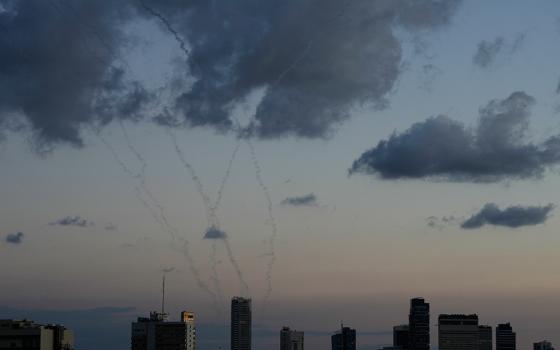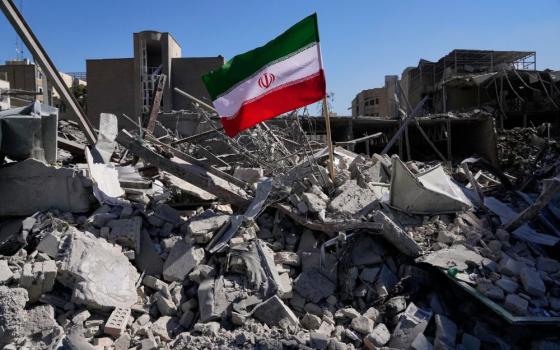The team at Migrant Farmworkers Assistance Fund in Kansas City, Missouri, cover a 55-mile radius through their variety of services for migrant farmworkers in local orchards. (GSR photo/Soli Salgado)
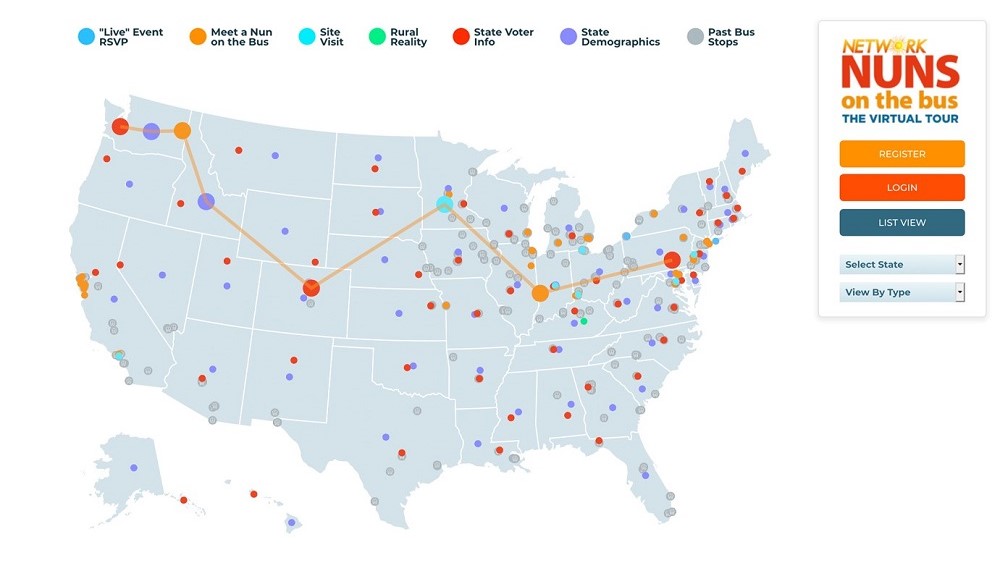
This year's Nuns on the Bus tour will be a virtual one, and participants will be able to choose their own stops on the "tour" as they build a route across the country. (Courtesy of Network)
Editor's note: Global Sisters Report is following the 2020 Nuns on the Bus virtual tour, which runs through Oct. 23. Nuns on the bus and GSR staff writers will share their experiences in this live blog, which will be updated a few times a week during the virtual tour. Read all of our Nuns on the Bus coverage.
Oct. 21: Support based in Kansas City for migrant farmworkers
By Soli Salgado, staff writer for Global Sisters Report
The harvest calendar dictates the life and route of a migrant farmworker: Apple and peach season means spending late summer and autumn in Missouri's orchards, while ripened citrus beckons them to Texas or Florida come winter. Sometimes, it's a single man sending money back to his family in Mexico; other times, it's a family on the move with children attending three or four schools a year.
And an unpredictable life on the road with no stationary home — sometimes the migrant isn't even sure in which state they live — leaves them relying on the Migrant Farmworkers Assistance Fund to help them with health care, basic needs like food, clothing and hygiene kits, educational support, and case management.
Suzanne Gladney, an immigration attorney and the program's executive director, shared the group's many services, as well as the typical situation of a migrant farmworker, with Social Service Sr. Simone Campbell on her Oct. 21 virtual stop in Kansas City, Missouri, for the Nuns on the Bus tour.
While some migrant farmworkers chose to make a home in Kansas City after working a season, taking care of the maintenance of the orchard when there's no harvest, this year, 150 to 200 migrants came through the region for the harvest. Living in labor camps deep in the orchard fields, the migrants find the work through word of mouth, following crew leaders who respond to the specific needs of orchard owners: produce pickers or labor for the packaging warehouses, a certain number at a time, family-friendly or only individuals.
Because the farmworkers' frequent transportation means they're limited in what they can bring and the small rural towns they live nearest to leave them with little access to stores, the Migrant Farmworkers Assistance Fund's services cover a 55-mile radius, including three orchards.
Elizabeth Reid, the fund's program director, said they've shifted their distribution events to be drive-throughs amid the pandemic, preventing them from engaging with the farmworkers on a more personal level to hear about their other needs that the group can help with. Still, they make their rounds: attending parent/teacher conferences to help translate, organizing hundreds of dental and medical appointments and picking up medicine for them, essentially becoming "their extended familia," as Campbell noted in response to their accounts.
So close is the tie between the migrant farmworker and the Migrant Farmworkers Assistance Fund that Gladney said the organization often serves as a post office box for the individuals, as they have no permanent address. She noted one man, Eugenio, whom she's known for 30 years, had just called her to ask if she received a document he was expecting.
And though they make $10 to $15 an hour depending on the work they're carrying out, the travel and lag time between jobs — orchard owners often request they arrive well before they can start working so they can ensure they have the labor they need when the time comes — keeps the migrant farmworkers well below the federal poverty rate.
Gladney told Global Sisters Report that her ultimate hope in participating in Nuns on the Bus was to make people more aware about the impoverished conditions migrants live in and our reliance on them for food.
In closing, Campbell affirmed that in the future, she will "reverence the fruit at the supermarket and pray to open my eyes to see what is unseen around me."
[Soli Salgado is a staff writer for Global Sisters Report. Follow her on Twitter: @soli_salgado. Her email address is [email protected].]
Migrant Farmworkers Assistance Fund founder and executive director Suzanne Gladney, left, and program director Elizabeth Reid discuss the lives and challenges of migrant farmworkers in an Oct. 21 Nuns on the Bus virtual session from their offices in Kansas City, Missouri. (GSR photo/Soli Salgado)
Oct. 20: 'Zooming' around St. Louis, talking of social justice
By Sr. Jeanne Christensen of the Sisters of Mercy West Midwest Community
Even though the Network staff and the dedicated sisters riding on the virtual bus were nearing the end of their journey, their enthusiasm remained high. They happily shared their reflections, technical expertise and their call to all of us on the St. Louis Nuns on the Bus tour.
The evening started when St. Joseph Sr. Margaret Schulz welcomed us to St. Louis and then led us in prayer. After Sr. Simone Campbell's welcome and introduction, Providence Sr. Emily TeKolste gave us a brief but clear lesson on what to expect when "zooming" around the event.
Our first "zoom" was to break the nearly 60 participants into pairs to share around the question, "Who in your family (or circle of friends) is difficult to talk politics with?" Many responded with their siblings, their cousins or a friend. Not everyone felt his or her conversations with the difficult one made any real difference. Some said they had mutually respectful conversations and felt they were heard.
Simone shared her reflection, starting with her writing and praying over her new book, Hunger for Hope. Included in her sharing was her strong belief in what matters. One example was how the media talks about Catholics as single-issue voters and questioning whether "the left" has faith.
She spoke passionately about protecting the pregnant mother as an essential part of the issue of caring for the innocent unborn. The mother must have health care, safe and affordable housing, child care, and a living wage. Repealing the Affordable Care Act is not caring for the mother and the child. Without a healthy mother, how can the child be healthy and well cared for? In simple terms, there must be integration of issues. No issue stands alone.
With all this in mind, the participants were zoomed to breakout rooms, where they conversed with four or five others. There were three questions to consider: How does your faith inform your political action or how you vote? What issues do you care about? Why are you a multi-issue voter?
Participants said their faith was "in their bones" and a lens through which they viewed other people, events or actions. Their faith was their motivation for their involvement in social justice issues; many noted they have spent much of their lives working for justice for others. The participants said conversations like the ones on the bus nourish them and encourage them to be involved.
Participants were encouraged to find others with whom to collaborate and learn about issues, noting that people of like minds working together can make change happen. Additionally, it is important to work for unity and connection within the Catholic Church and to find common ground with other faiths in order to work for change.
A variety of issues was identified, and it was clear that participants saw the issues as interconnected. This was one of the primary reasons they were multi-issue voters. Participants also considered the necessity for us to remember that everyone is made in God's image, and when we devalue others, we devalue God. One of the participants noted that in Matthew 25, Jesus focused on multiple issues.
It is imperative that we use our voices. Putting our knowledge of theology, church teachings or Scripture into practice is what matters. We must also release any belief we have of our own superiority or sense of entitlement. White privilege bestows power and, when misused, harms others, especially the most vulnerable.
Zooming back to the large group, several noted they could have used more time for conversation.
Some closing thoughts included:
- Where is the prophetic witness from the pulpit?
- How can we encourage the clergy to become involved in social justice?
- What are seminarians learning about social justice?
- There is a need for lay leaders in social justice.
- The role of women religious has expanded.
- Offer to assist diocesan leadership, including the bishop, to learn about social justice in the diocese.
- It is essential that we go to the heart of the issue and ask the "why" question.
The last zooming was encouragement from Network staff to download their Equally Sacred Scorecard, to talk with others about why we are multi-issue voters and make sure everyone votes.
Remember: Who we elect matters!
[Sister of Mercy Jeanne Christensen lives in Kansas City, Missouri, and serves as the justice advocate against human trafficking for the Sisters of Mercy West Midwest Community.]
Oct. 16: In Cincinnati, a discussion on how 'everything is connected'
By Sr. Caroljean Willie of the Sisters of Charity of Cincinnati
While offering a warm welcome to the Queen of the West at Network's Oct. 16 town hall meeting in Cincinnati, participants also learned of the high poverty rate that exists in the city.
The opening prayer began with a quote from Nobel Peace Prize winner Wangari Maathai that reminded us that we are called to be people of hope — even, and perhaps more so, in the midst of the turmoil that surrounds us.
Participants reflected on how the coronavirus has given us an opportunity to look at ourselves and remember that we all belong to each other. Pope Francis' injunction that we have to move to the margins came up repeatedly during the discussions.
Racism and the need to confront it was a recurring theme. There was unanimity in agreeing that racism and inequality have to be dealt with at the systemic level, that it is a structural problem affecting our society negatively in our treatment of people considered "minorities." Even the term "minorities" itself was called into question if we truly believe we are equally loved as children of God. This belief in the dignity of all people forces us to look at how all people in society are treated and be willing to speak up and act with clarity and integrity, to call out the injustices in our own backyards, but also to offer our time and efforts to find solutions.
One of the greatest challenges expressed was that of getting people to listen to what we are saying about the sacredness of all of life, referring not only to people, but to all of creation and the responsibility we have to care for it. Suggestions offered included the need to try to find at least one kernel of common ground with the person with whom you disagree, and also being sensitive to your audience and willing to enter into dialogue.
Whether discussing racism, immigration, climate change or the pandemic, Pope Francis' words that "everything is connected" were a constant reminder that who we elect matters.
[Caroljean Willie is a Sister of Charity of Cincinnati who has a Ph.D. in multicultural education. She has extensive experience working cross-culturally throughout the United States, the Caribbean and Latin America.]
Oct. 15: The dire need for health care in Wise, Virginia
By Sr. Cecelia Cavanaugh of the Sisters of St. Joseph of Philadelphia
On Oct. 15, the Sisters of St. Joseph foundation day, I "visited" the Health Wagon in Wise, Virginia. I found our congregation's values of meeting the needs of "the dear neighbor" incarnated in the mission of the Health Wagon, which provides medical care for the working poor in Appalachia.
Dr. Teresa Tyson and Dr. Paula Hill-Collins shared the energy and insights that fuel their mission. As they repeated the phrase, "This is the United States of America," they named staggering statistics: a life expectancy shortened by 20 years on average, high percentages for illnesses, addiction, lack of medical insurance of working people who are earning their way out of eligibility for Medicaid and into debt and preventatable illness.
A Catholic sister working in Africa to provide medical care to people on the margins. A young woman growing up in the United States, dreaming of being a missionary doctor. Thousands of men, women and children, many standing in line for days to have access to free medical, vision and dental care. These three came together in extraordinary ways in a mission field, but not in an African country, as one might conclude.
Sr. Bernadette Kenny, a Medical Missionary of Mary, met Teresa in Virginia, Teresa's home state. Sister Bernie was missioned from Africa to southwest Virginia in 1978 to provide health care to people who are medically underserved. Teresa found her missionary calling in staying home, earning her nurse practitioner credentials and inheriting the directorship of the Health Wagon in from Sister Bernie.
Teresa and Paula, the clinical director and Teresa's partner in mission, call this being "covered by Sister Bernie's cloak" (1 Kings 19:19). As they described their efforts to Sr. Simone Campbell, they repeated the refrain, "This is the United States of America," and it echoed in my soul. This is not a country in the developing world. My city is in one of the wealthiest nations on the planet.
As Sister Simone spoke with Teresa and Paula, I heard another refrain: "innovation, innovation, innovation." This includes the Health Wagon, bringing clinical care to those with no way to travel to two health care sites. Drones deliver prescriptions. Telehealth provides counseling. It demands networking — building collaborations across faith traditions, health and educational institutions, for example — and creatively meeting needs as they arise.
As I reflected on these refrains and the way they are enmeshed in the work of the Health Wagon, I thought of all the people I know in Philadelphia working for justice and dignity for every dear neighbor. Teresa and Paula are sustained by that which energizes them and moves them to relentless action. "God provides." "God does not call without providing the means." "This is the United States of America." We can do this.
[Sr. Cecelia Cavanaugh of the Sisters of St. Joseph of Philadelphia is the former dean of the School of Undergraduate Studies at Chestnut Hill College.]
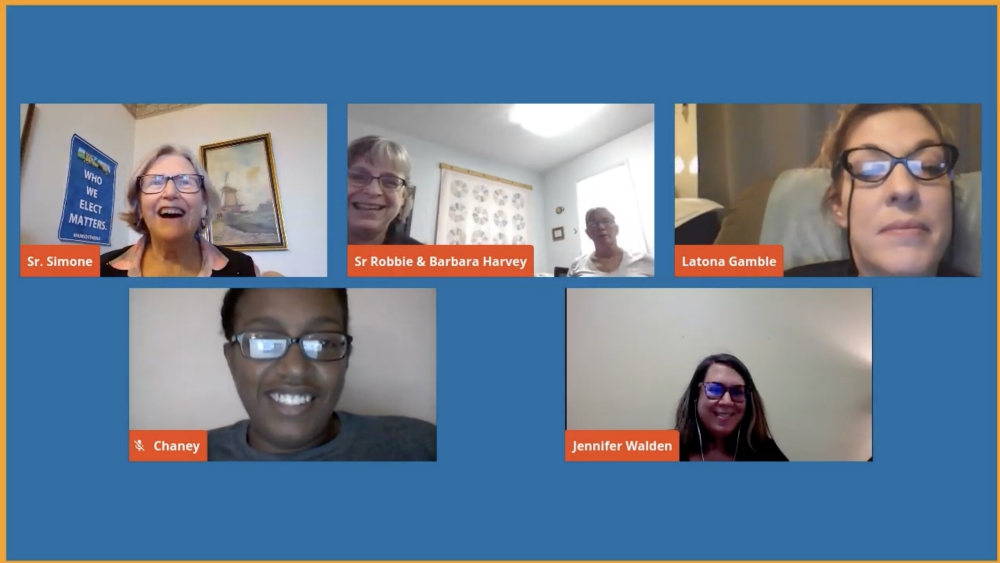
Social Service Sr. Simone Campbell of Network, top left, during a virtual Nuns on the Bus visit with the New Opportunity School for Women in Berea, Kentucky (GSR screenshot)
Oct. 13: New opportunities for women in Berea, Kentucky
By Dan Stockman, GSR national correspondent
Latona Gamble was contemplating suicide when she heard about the New Opportunity School for Women in Berea, Kentucky.
"I was drowning in depression," Gamble told viewers of the Nuns on the Bus site visit to the little nonprofit about 40 miles south of Lexington. "I said, 'Let's try this. I'm already at the bottom. It can't get worse.' "
The New Opportunity School for Women works with low-income women from across Kentucky but focuses on the Appalachian region, helping them gain the tools to improve their financial, educational and personal circumstances.
Oldenburg Franciscan Sr. Robbie Pentecost, the executive director, said the school uses peer mentors in a two-week program that helps with self-esteem and professional development. Graduates of the program see a new future for themselves outside of poverty.
"Many of the women we work with have never had the opportunity to really dream about their future," Pentecost said.
Gamble said she had to move to Berea, away from her family in Hazard, Kentucky, to escape poverty and chaos. She now works at the school and takes college courses.
"These women are my family," she said. "My goal was to stop a generational curse. ... I had had it, so I ended it with me."
Chaney Jackson said the school turned her life around. She is in her last semester for an associate degree in science, is applying for nursing school, and used her new financial management skills to pay off student loans, buy a car and take her children to Disney World.
"This is powerful," Jackson said. "To walk right, head up, back straight — it's an amazing feeling."
Jennifer Walden applied to Berea College the day she graduated from the program and is now program coordinator for the New Opportunity School for Women. Trauma and poverty hold women back in ways many don't think about, she said.
"Trauma-induced depression so often leads to self-isolation as a protective measure," Walden said. "So at a time when most women are building up their social and professional networks, women who are impacted by trauma or poverty — and poverty is very much trauma in itself — they're disengaging from that, and it creates this new barrier."
Oct. 9: Discussing the three C's at a San Antonio town hall
By Sr. Bernadine Karge of the Dominican Sisters of Sinsinawa, Wisconsin
Friday night, Oct. 9, found 77 folks on the bus at Network's town hall in San Antonio, sponsored by the Intercongregational Leadership Group of San Antonio. The seven men on the bus were outnumbered 10 to 1 by women. Curiously, three of the seven were named James or Jim!
In the opening prayer, we called upon the fire of the Spirit to give us audacity and hope in this election season to engage in dialogue with others even though we may disagree with their viewpoints. Encounter, being together and seeking a future of freedom will enable us to be community.
Our animated interfaith exchange evolved into the three C's: the common good, character and conscience. Most of the attendees lived in the San Antonio and Austin areas. As part of this wonderful multicultural, multilingual, multiracial world, they identified immigration as one of the key issues in which they are involved.
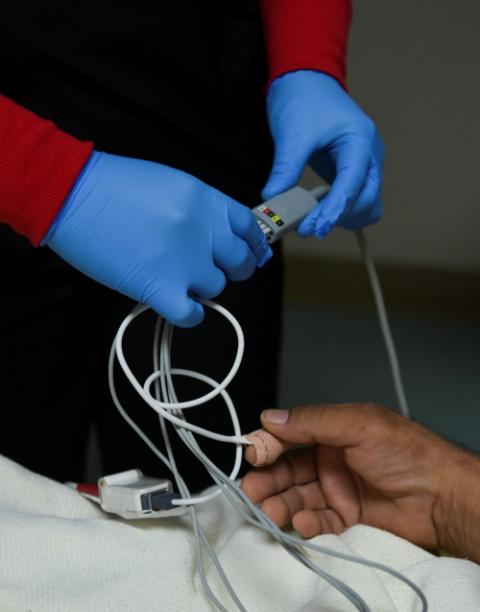
A health care worker adjusts a monitor on a patient's hand at United Memorial Medical Center in Houston Sept. 30. Texas ranks 50th in the United States for access to affordable health care. (CNS/Reuters/Callaghan O'Hare)
The fact that Texas ranks 50th in the United States for access to affordable health care was raised by many as something they are not proud of as Texans.
Those who work in agriculture know the need to organize, cooperate and work to bring in the harvest. Care for the environment, care of the Earth, education and economic equity were also added to the common-good stew.
The character of whom we elect was raised as most important. Is there one who can see how our policies are the sources of suffering, inequity, grief and fear among the community? Is there one who can recognize those who suffer with empathy and compassion?
One of the nuns on the bus who recently returned to the United States after 50 years on mission in many African countries reflected on the blast of vitriol present in the public discourse in the United States. In this time of fever pitch, we need the ability to listen to another, to respect the human dignity of each person, to seek truth and to live with integrity.
"Be curious, not furious" was a slogan shared to be a means to encountering another without judgment.
As we moved on in our conversation, the word "conscience" came to the fore. We raised the fact that the issues of this time cross interfaith barriers. An integrated, holistic approach to honoring each human is possible. Each person has a conscience, whether they operate out of a faith tradition or not. Each of us can choose to show empathy. As someone remarked, "A little goes a long way."
One thing that the COVID-19 rollercoaster has taught us is that we are all in this together. There is something we can do: Get out to vote and bring your friends. "Silence is violence."
[Sr. Bernadine Karge is a Dominican Sister of Sinsinawa, Wisconsin, who has practiced immigration law in Chicago for more than 30 years.]
Oct. 8: Farmworkers' rights, a tomato success story
By Dan Stockman, GSR national correspondent
She may have only been in Immokalee, Florida, virtually, but Sr. Simone Campbell learned much about farming as the Nuns on the Bus tour visited the Coalition of Immokalee Workers Oct. 8.
"I'm such a city girl," Campbell declared. "I know so little."
Campbell, a Sister of Social Service and executive director of the Catholic social justice lobby Network, talked to coalition staffers about their efforts with the farmworkers in the area. Most work on tomato farms, but there are other types of agriculture in the area.
Coalition staff member Nely Rodriguez said the coalition was formed in the early 1990s because of the abuse that existed in the industry at the time.
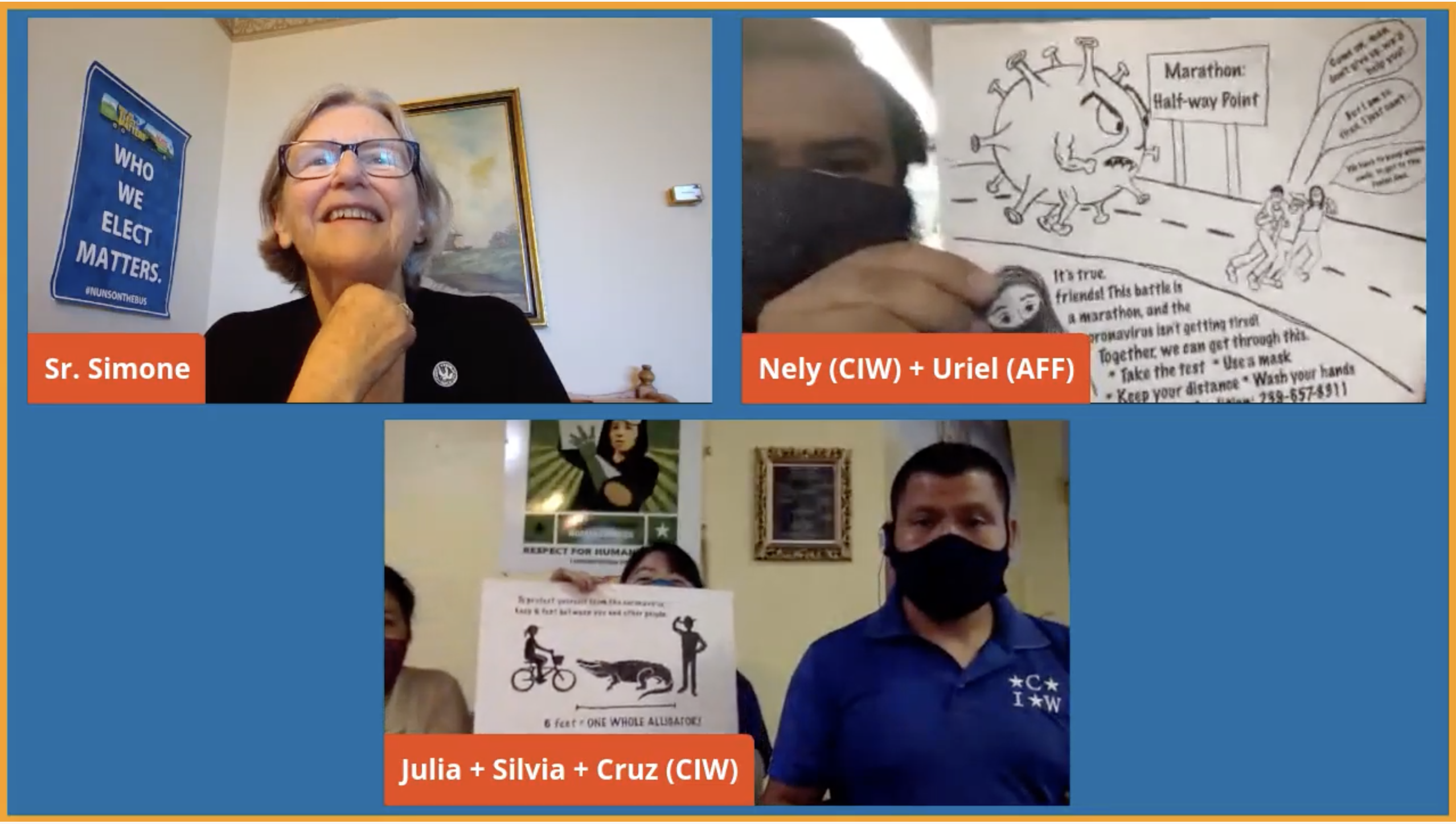
Sr. Simone Campbell of Network, top left, during a virtual Nuns on the Bus visit with the Coalition of Immokalee Workers in Florida (GSR screenshot)
"It was not rare for there to be instances of physical abuse, instances of wage theft, and basic rights such as access to water or a bathroom were not a given," Rodriguez said. "Immokalee in the 1990s was known as ground zero for human trafficking."
She said Immokalee is a diverse community, with native Seminole and immigrants from Mexico, Guatemala and Haiti, so one of the first efforts of the coalition was language education. In addition to the physical and sexual abuse, wages for farmworkers were sub-poverty: 30 cents for picking a 32-pound bucket of tomatoes.
Now, thanks to their Fair Food Campaign, 14 of the largest food corporations in the world have become partners with the coalition, agreeing to pay one penny a pound more for tomatoes, with that penny going directly to farmworkers, to have a zero-tolerance policy for gender-based violence and human trafficking in the fields, and to allow farmworkers to speak out without fear of retribution.
Julia De La Cruz was a farmworker before joining the coalition staff, and was abused and saw others abused, she said.
"One reason I do this work is to expand these protections to farmworkers," De La Cruz said. "They are considered essential workers, so they're continuing to go to work [during the pandemic], but they get very little protection. We're trying to use our power and our platform to provide those resources."
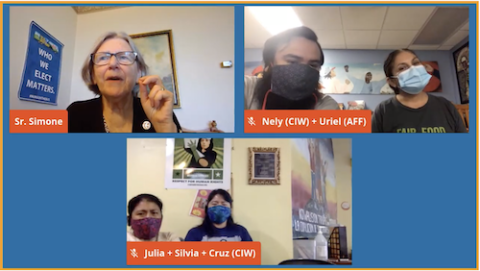
Sr. Simone Campbell of Network, top left, during a virtual Nuns on the Bus visit with the Coalition of Immokalee Workers in Florida (GSR screenshot)
Campbell said that before the site visit, she only thought of farmworkers as harvesting crops, but learned they also plant them, tend them, and in the case of tomatoes, put up strings for them grow on.
"This conversation has really been a gift to all of us," she said. "Thank you for your leadership … you're changing hearts."
[Dan Stockman is national correspondent for Global Sisters Report. His email address is [email protected]. Follow him on Twitter or on Facebook.]
Oct. 6: Let's go, Homeboys
By Sr. Susan Rose Francois of the Sisters of St. Joseph of Peace
"Are we not each better than our worst moment?" I have never forgotten that question, ever since I first heard it raised by Fr. Gregory Boyle during a presentation at the LA Religious Education Congress more than a decade ago. It was such a countercultural question, centered on goodness, compassion, human dignity and the power of redemption. I have returned to that question at times when I have not been my best self. It has helped me pick myself up, dust off the cobwebs and start again. I have returned to that question when I've accompanied others. It is a question that leads to community and future possibility.
Flash forward to this week's Nuns on the Bus virtual site visit with Homeboy Industries in Los Angeles, California. The goodness of the men gathered on the call for a conversation with Sr. Simone Campbell — Father Greg, Miguel and Franky — jumped off the screen. I found myself leaning into the screen and smiling, even as they shared stories of their own struggles. Miguel and Frank, both formerly incarcerated gang members, exuded care, compassion, love, and a desire to build community.
"I love life," said Miguel. "I am living life to the fullest." His eyes lit up as he told Sister Simone about being part of the Homeboys' response to address food insecurity caused by the pandemic. Homeboy Industries has pivoted their operations and is now providing 10,000 meals each week to seniors and people experiencing homelessness. "It feels so good to be giving back to the community after taking so much," said Miguel.
Franky talked about the transformative power of community. "The energy you see and feel here helps me to get where I want to be," he said. Frankie is working to get out the vote this election season, making sure that the formerly incarcerated know how to exercise their voting rights. He knows first-hand that voting matters because his own sentence was reduced due to California Proposition 57, passed by the voters in 2016, which authorized sentence credits for rehabilitation, good behavior and education.
My mother spent many years working with incarcerated men and women, helping them to develop decision making skills and prepare for life after their release. I couldn't help but think about my Mom as I listened to Miguel and Franky describe the power of community. "What I needed," said Miguel, "was for my community to be able to hold me." They both talked about what it meant to them when Father Greg remembered them, knew their name, and showed that he cared. "It's kind of a thrill to be valued and cherished," said Father Greg. "It's the thing that motivates."
Father Greg said that he hopes we all have 2020 vision now. "I am both hopeful and optimistic at the same time," he said. Listening to Miguel and Franky, I am not surprised he feels this way.
My virtual site visit to Homeboy Industries was motivating and energizing. It reminded me that what really matters is being a community of support, in our own circles and beyond, in good times and in bad. Whether it's bringing food to the hungry, encouraging their peers to vote or reconnecting with local communities and families in positive and life-giving ways, these men are witnesses to the power of community. Violence and fear will not have the last say. May love, not fear, go viral. Amen.
[Susan Rose Francois is a member of the Congregation Leadership Team for the Sisters of St. Joseph of Peace. She was a Bernardin scholar at Catholic Theological Union and has ministered as a justice educator and advocate. Read more of her work on her blog, At the Corner of Susan and St. Joseph or in GSR's Horizons columns.]
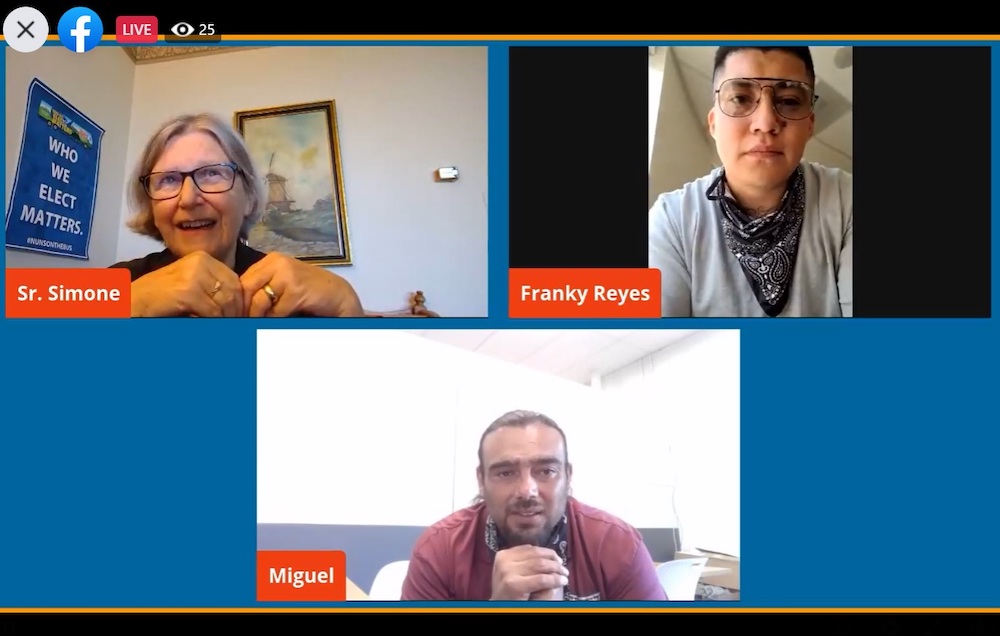
Virtual site visit to Homeboy Industries, picturing, top right, Sr. Simone Campbell of Network; top left, Franky Reyes; and bottom, Miguel (Susan Francois screenshot)
Oct. 1: Spirit-filled voters gather in Detroit
By Sr. Jan Kilian of the Franciscan Sisters of Little Falls, Minnesota
"I think I can! I think I can!" said the little train chugging up the mountain; so says this big bus virtually zooming across the United States.
With Sr. Simone Campbell at the wheel, the Network bus made it to the Carney Latin American Solidarity Archive, or CLASA, at the University of Detroit Mercy on Oct. 1. We were co-hosted by the Sisters, Servants of the Immaculate Heart of Mary.
Gail Presbey from CLASA described the archived stories of immigrants struggling for ways to make a livelihood in their new land. The stories we continue to hear of racial and gender discrimination, poverty, disenfranchisement, nonacceptance into community, impairment of the right to vote, struggles to welcome the stranger — all are archived even as they continue today. Immaculate Heart of Mary Sr. Elizabeth Walters and Barb Beasley described their work with yearlong education and action networks to prepare for the upcoming election.
We spent a few moments breathing in deeply and breathing out slowly in prayer, led by Barb Beasley.
We share the air on Earth. We breathed this shared air into our lungs during prayer. All together, we breathed this air out of our lungs. We live in and walk through air we share, every living being on Earth; we are united as one in the very breath we share. We are all in this together.
Voting is a communal action and a moral imperative. As the discussion began, I was reminded of a statement from a previous town hall: "Bad politicians are elected by good citizens who don't vote."
Some of the concerns raised by these spirit-filled voters in Detroit included the right to life, climate change, economics, health care, immigration, racism and getting out the vote. Sister Simone spoke of her new book, Hunger for Hope, which is available through Network. We must bring moral vision to all issues of public life.
[Sr. Jan Kilian is a Franciscan Sister of Little Falls, Minnesota. She has an academic background in hospital medical records, human development, and spiritual direction.]
Sept. 29: A center based on women's needs in Flint, Michigan
By Dan Stockman, GSR national correspondent
The virtual Nuns on the Bus tour rolled into Flint, Michigan, on Sept. 29 to visit the St. Luke N.E.W. Life Center, which provides meals, a food pantry, literacy classes and job training to about 3,000 clients a month.
Sr. Simone Campbell, executive director of the Catholic social justice lobby Network, chatted with the center's co-directors and founders, St. Joseph Sr. Judy Blake and Adrian Dominican Sr. Carol Weber, as well as Tiffany DePriest-McIntyre and Christine Williams, who are both graduates of center programs and now work there.
Blake said the roots of the center were planted on a 30-day retreat about 20 years ago, and she kept having a dream in which women were saying, "Help us. We need your help. We're talented, we're gifted, we can do things. We just need some help." She had no idea what it meant or what she should do about it except pray.
Then, in 2000, the woman Weber was sponsoring for confirmation needed a project before she got confirmed. So the three of them went out on the street and began passing out clothing and food to those in need.
On one trip, they learned a woman had given birth by herself at home the night before and had nothing but a sweatshirt to wrap the baby in, they realized they had to do more than just hand out food and clothes. St. Luke Catholic Church in Flint helped get the center off the ground.
When they had a chance to move into a former school two years later, they asked the women they were serving what they needed. Over and over, they heard they needed a safe place, education, and a way to gain self-esteem.
"That's how we built the program," Weber said. "It's all based on their needs."
Weber said they hope to eventually add transitional housing for women who have been abused.
"We're trying to figure out how to ... get them somewhere safe. All the programs are full," Blake said. "There's no room anywhere."
[Dan Stockman is national correspondent for Global Sisters Report. His email address is [email protected]. Follow him on Twitter or on Facebook.]
Sept. 28: Ways to hold all life sacred
By Sr. Gemma Doll of the Dominican Sisters of Peace
I rode into the Zooming Nuns on the Bus trip all the way to Des Moines, Iowa. Many of the participants were from Iowa Citizens for Community Improvement, which hosted us. Social Service Sr. Simone Campbell expanded Pope Francis' call that Catholics hold all life sacred.
In small-group sessions, both Catholics and other faith believers resonated with the idea that every issue is connected. As a pro-life Catholic and a pediatric nurse, I know that to save the life of the unborn, I must care for the health of the pregnant mother and ensure adequate housing as well as access to quality health care, and she must have a healthy diet and not suffer discrimination. Above all, she depends on Mother Earth's health to provide resources for her and her unborn baby.
We enter political discussions through one door and realize that the house of multi-issues is equally important. That is why I am a multi-issue Catholic voter!
[Dominican Sr. Gemma Doll is a member of the Dominican Sisters of Peace's leadership team.]
Advertisement
Sept. 25: Where democracy and science fiction merge
By Sr. Michele Morek of the Ursuline Sisters of Mount St. Joseph, Kentucky
I am a 2020 nun on the bus, and it is a "Star Trek" experience.
Instead of climbing on a bus Sept. 25, I walked to the back bedroom of our home in Roeland Park, Kansas, turned on the computer, and — "Beam me up, Scotty" — I was at a town hall in Buffalo, New York, engaging in my first virtual Nuns on the Bus event.
The 2020 Nuns on the Bus tour began Sept. 21 in Pittsburgh, but the official kickoff was Sept. 23 with House Speaker Nancy Pelosi, Sen. Cory Booker, Mary Kay Henry of the Service Employees International Union, the Rev. Willie Barber II, Amy Jo Hutchison, and the Rev. Otis Moss III. I especially liked Amy Jo, who gave a vivid personal account of what it's like to live in poverty in America.
The bus trip will conclude with a national rally Oct. 23 after crisscrossing 16 states with 63 live events, including town halls and site visits, spreading the message: "Who we elect matters."
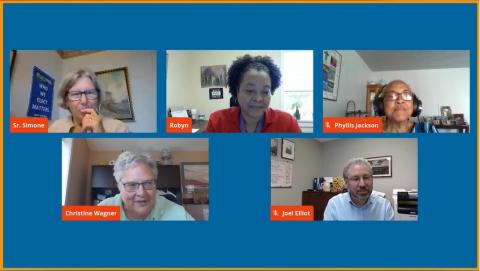
A screenshot of the virtual Sept. 25 site visit to St. Joseph Neighborhood Center in Buffalo, New York (Courtesy of Network)
I jumped on the bus because I am worried. How can we have a democracy if we can't talk to our family or neighbors about things that matter?
The first stop I made on the bus was the town hall for "Spirit-filled voters" in Buffalo. After a quick Zoom tutorial, we heard from Social Service Sr. Simone Campbell, executive director of Network, the Catholic lobby for social justice that organizes the bus tour, and three of the Nuns on the Bus — including me! — about why we are multi-issue voters.
All attendees got to talk to each other in small groups in virtual breakout rooms about how our faith informs our political engagement. (It is always good to start a conversation with discovering shared values.) We also discussed what issues we care about and why we are multi-issue voters, before coming back to share in the large group.
From the discussion, I picked up several good tips about how to talk about difficult issues:
- Tell a personal story about why you feel the way you do about an issue. (Nobody can argue with a personal story.)
- Ask them how their stories brought them to hold their values and opinions.
- Listen with attention and compassion.
The really cool thing about this virtual tour? Whether you are a nun in real life or not, you can be a nun on the bus in an interactive game. Personally, I am well on the way to coloring in my bus for a prize. Click on the website to see the many wonderful activities and features. And then just say, "Beam me up, Scotty!"
And follow Network on Facebook and Twitter.
[Ursuline Sr. Michele Morek is Global Sisters Report's liaison to sisters in North America. Her email address is [email protected].]




